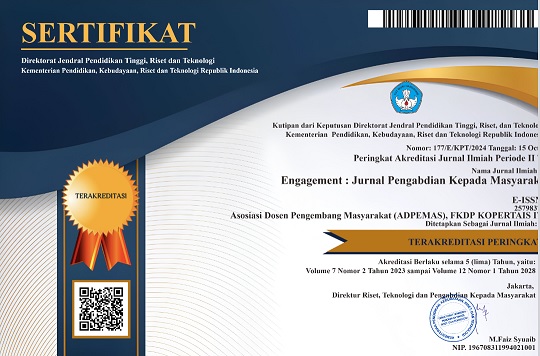Development of Education Facilities Based on Food Security as Agro-tourism through Community Empowerment in the Banyubiru Village, Banten
Abstract
The purpose of community service activities is to improve the economy of the Banyubiru village community by making the Banyubiru village a resilience-based agro-tourism village. The method of implementing this activity was through the development of an educational vehicle, namely a maze of maize vehicle, a tomato picking vehicle, a hide-and-seek vehicle, a fishing mania vehicle and an animal feeding vehicle. All of these rides are carried out with community empowerment through mentoring and counseling. The method of implementing this activity is carried out using the learning community approach. The subjects of this activity were only selected by 50 communities, namely 25 men and 25 women. All of them are over 20 years old and less than 50 years old. The results of the implementation of community service activities indicate that there is an increase in community economic income. This can be seen from the addition of tourists in the past month. Every week the number of tourists rises 5%, from the number of visitors there. The response from tourists was 87% from the results of the interviews we had done. The results of tourist responses show very good results for tourists who visit. Furthermore, the results of observations on food security awareness of 75%, this means that the villagers are included in the good category and already know how to manage natural resources into agro-tourism villages based on food security.
Downloads
References
Eun, Jeong. “A Formative Intervention on Mobile Learning Community.” Procedia - Social and Behavioral Sciences 191 (2015): 68–76. https://doi.org/10.1016/j.sbspro.2015.04.655.
Li, Shan, Juan Zheng, and Yunfeng Zheng. “Towards a New Approach to Managing Teacher Online Learning : Learning Communities as Activity Systems.” The Social Science Journal, 2019. https://doi.org/10.1016/j.soscij.2019.04.008.
Lina, Mei, Fitri Kumalasari, and Abdul Muhid. “Community Mentoring Through Efforts to Use the Waste of Cow Dung into Biogas and Organic Fertilizer towards Energy Independent Society.” Engagement 04, no. 01 (2020): 1–13.
Oktavallyan, Dwi, Samsul Bahri, and Recky Yundrismein. “Pendampingan Pembuatan Desain Kawasan Pariwisata Berbasis Komunitas ( Community Based Tourism ) Pada Kelompok Sadar Wisata Di Kawasan Danau Gedang Kabupaten Bengkulu Tengah.” Engagement 04 (2020): 76–86.
Pandeglang, Bupati. “Bupati Pandeglang Provinsi Banten Peraturan Daerah Kabupaten Pandeglang,” 2021.
———. “Desa Banyubiru.” http://banyubiru.desa.id, 2019.
———. “Peta Lokasi Pandeglang.” https://petalokasi.org/Kabupaten-Pandeglang/Taman-Desa-wisata-Banyubiru, 2019.
Rn, Deborah Carpenter, Susan Hassell Ms, Russ Mardon, Shannon Fair Rn, Maurice Johnson Jr, Sari Siegel, and Mary Nix Ms. “Using Learning Communities to Support Adoption of Health Care Innovations.” The Joint Commission Journal on Quality and Patient Safety, 2018, 1–8. https://doi.org/10.1016/j.jcjq.2018.03.010.
Tamam, Ahmad Badrut. “Pengembangan Agrowisata Berbasis Komunitas Melalui Program Edukasi Wisata Dan Entrepreneurship Menuju Kemandirian Ekonomi Masyarakat.” Engagement 04, no. 01 (2020): 100–115.
Theobald, Karen A, Carol A Windsor, and Elizabeth M Forster. “Engaging Students in a Community of Learning: Renegotiating the Learning Environment.” Nurse Education in Practice, 2018. https://doi.org/10.1016/j.nepr.2017.12.008.
UNTIRTA, Lembaga Penelitian dan Pengabdian Masyarakat. “Rencana Induk Penelitian,” 2020.
Xing, Wanli, and Fei Gao. “Exploring the Relationship between Online Discourse and Commitment in Twitter Professional Learning Communities.” Computers & Education, 2018. https://doi.org/10.1016/j.compedu.2018.08.010.
Yilmaz, Ramazan. “Computers in Human Behavior Knowledge Sharing Behaviors in E-Learning Community : Exploring the Role of Academic Self-Ef Fi Cacy and Sense of Community.” Computers in Human Behavior 63 (2016): 373–82. https://doi.org/10.1016/j.chb.2016.05.055.
Yin, Hongbiao, and Xin Zheng. “Facilitating Professional Learning Communities in China : Do Leadership Practices and Faculty Trust Matter ?” Teaching and Teacher Education 76 (2018): 140–50. https://doi.org/10.1016/j.tate.2018.09.002.
Copyright (c) 2022 Engagement: Jurnal Pengabdian Kepada Masyarakat

This work is licensed under a Creative Commons Attribution-ShareAlike 4.0 International License.






.png)




